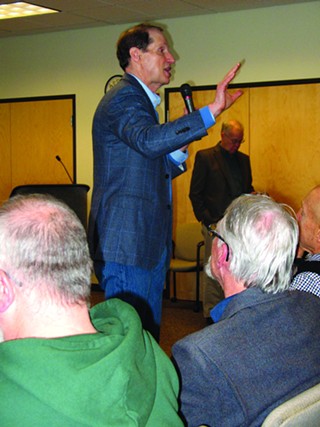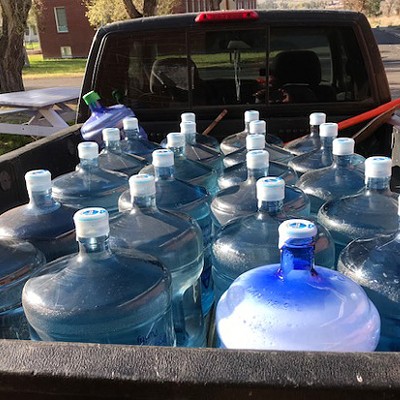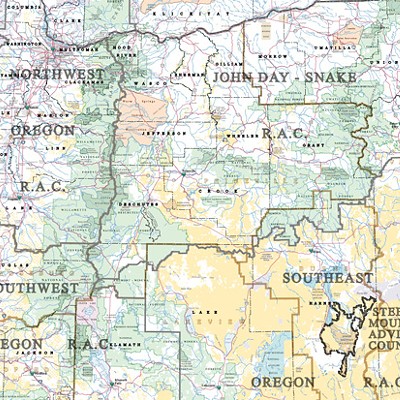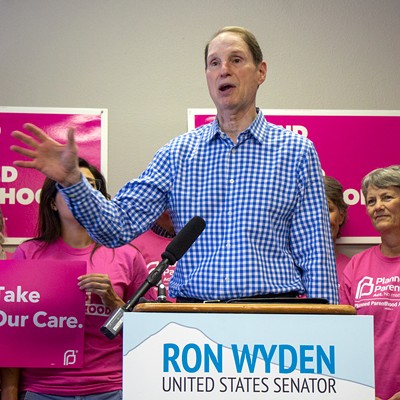If the questions fielded by Sen. Ron Wyden last Friday are any indication, Central Oregonians are concerned about the environment and the economy, and how to strike a balance between what appear to be competing interests.
In his first town hall of 2015, the Democratic senator spoke to a standing room-only crowd of about 200 people at the Deschutes County services building. Those with questions took numbers DMV-style and waited patiently until their numbers were called.
And when Sen. Wyden had answers, he provided them. Otherwise, he either tried to tie the issue to past or projected legislative victories or advised his staff to get the person's information to follow up.
Many of the senator's zinger-filled comments elicited applause from the audience. But this was no ego-boosting political rally packed with supporters. At various points, dissent could be heard among those in the crowd, and those who felt their questions went unanswered unapologetically pressed the senator for more information.
Among the topics garnering applause were Sen. Wyden's promises to reform campaign finance laws, keep government surveillance in check, ensure budgets reflect voters' values, and strike a balance with natural resource issues. The crowd also cheered on comments made by audience members about the crippling effect of poor credit scores and concerns about herbicides.
Highlighting the tension between environmental and economic concerns was the proposed Whychus-Deschutes Wilderness. A number of people, including representatives for Oregon Natural Desert Association (ONDA) and Oregon Wild, spoke out in favor of the proposal to extend federal wilderness protections to the area, while others wearing anti-Whychus-Deschutes Wilderness buttons asserted that the area was well-enough protected already.
"We have a tremendous opportunity in the Whychus region," explained Dan Morse, conservation director for ONDA. Now that Democrats are in the minority in the Senate, he asked, "How will the wilderness package go forward?"
Sen. Wyden explained that the public statements made by new members of the House and Senate raise questions about the future of wilderness bills. He also used the opportunity to remind those gathered of his perspective on the designation of wilderness areas.
"I think public lands are an economic engine," Wyden explained. "I know when the government was shut down, people seemed to care most about having access to public treasures."
The challenge, Sen. Wyden said, is to bring together "people of goodwill" in the industry, environmental scientists and other stakeholders to balance economic and environmental concerns. He pointed to John Day, and the successful collaboration there between environmentalists and loggers to save the town's mill, as an example — going so far as to call it "the future of forestry."
But one audience member questioned Sen. Wyden's claim that he approaches natural resource issues with a moderate perspective.
"I don't believe I've seen a wilderness bill you haven't supported, regardless of the impact," the man said. "This area is already protected."
He went on to explain that residents of Crooked River Ranch had done a survey finding 66 percent opposed the proposed wilderness protections, and said he brought a petition to that effect with 214 signatures. He argued that the area doesn't meet wilderness criteria and that local stewards have been dong a fine job of taking care of the area.
"I want to set the record straight." Sen. Wyden responded. "Plenty of environmental folks have things they think I haven't supported. When you do strike a balance, you do get a lot of people angry on both sides. That's what a balanced approach looks like."
He added that he has not yet made up his mind about the proposal, while relenting that making policy around contentious natural resource issues is a largely thankless task.
"When you're trying to make natural resource policy, hardly anyone throws you a parade the day after the bill gets written," Wyden explained.
Perhaps that was why the senator made a point to call out the actions he has taken. When one commenter, representing Oregon Wild, expressed concern about helicopter tours operating over Crater Lake, Wyden seemed taken aback.
"We blocked helicopter flights," Wyden said, looking to his natural resources staffer. "I thought I stopped that cold."
In a testament to the fact that no man is an island, least of all a U.S. senator, Wyden's staffer clarified that he had actually given the National Parks Service veto authority but hadn't taken action to ban any future helicopter tour operators.
The audience member who raised the concern pointed to this incomplete protection as an argument for extending further federal protections to Crater Lake.
"These things will continue to happen because there are no wilderness protections," he said.
While Sen. Wyden made no promises about extending wilderness protection for the park, he encouraged those concerned to work on building support among affected businesses, landowners, and others.
He said he's taking a similar approach to garnering support for the O & C Act, which seeks to reduce logging on former Oregon & California Railroad lands.
"The priority, at a time when there is so much polarization and bickering, is trying to bring people together," Sen. Wyden said. "I will do all I can to build support on the other side of the aisle."




























